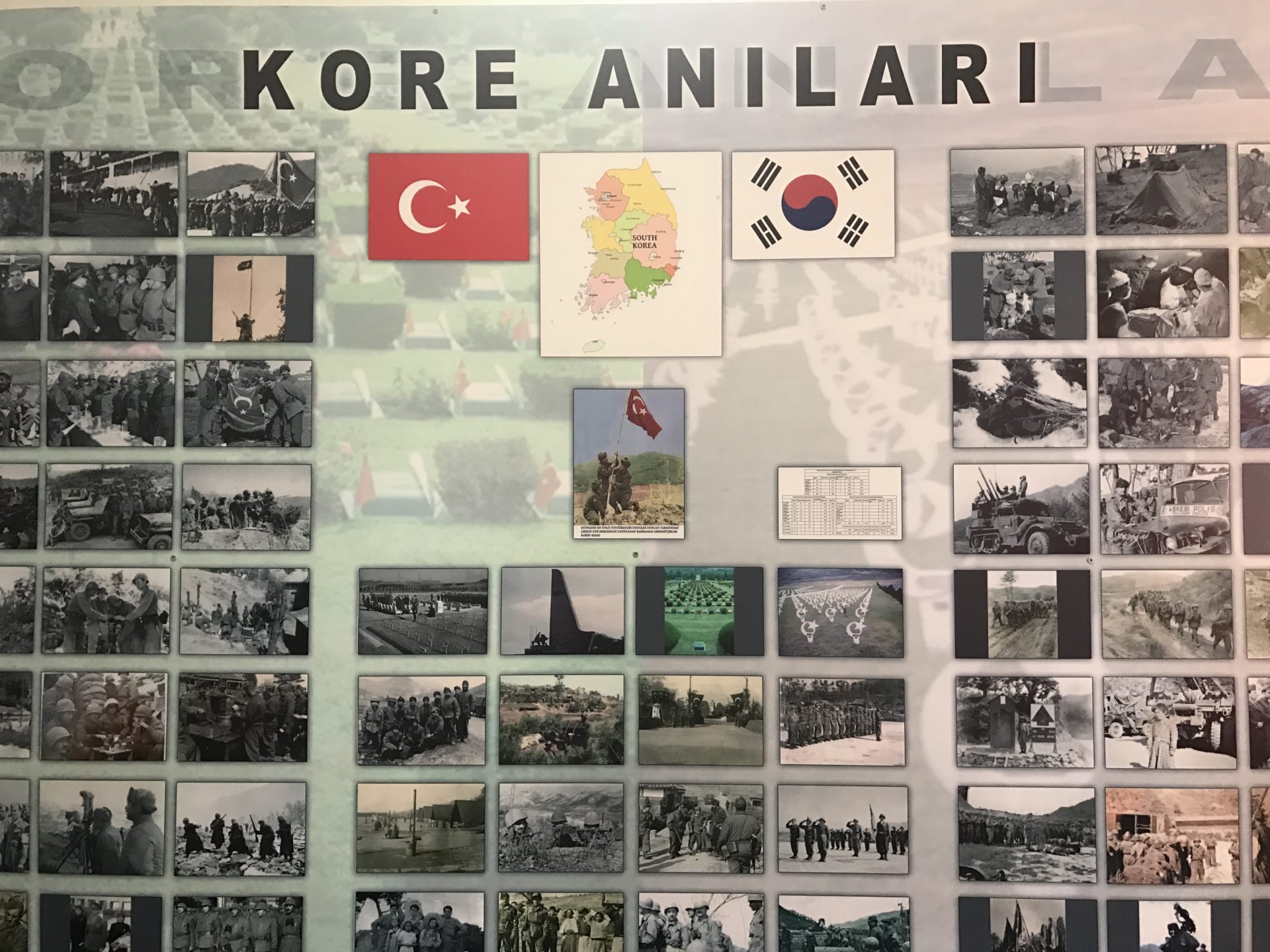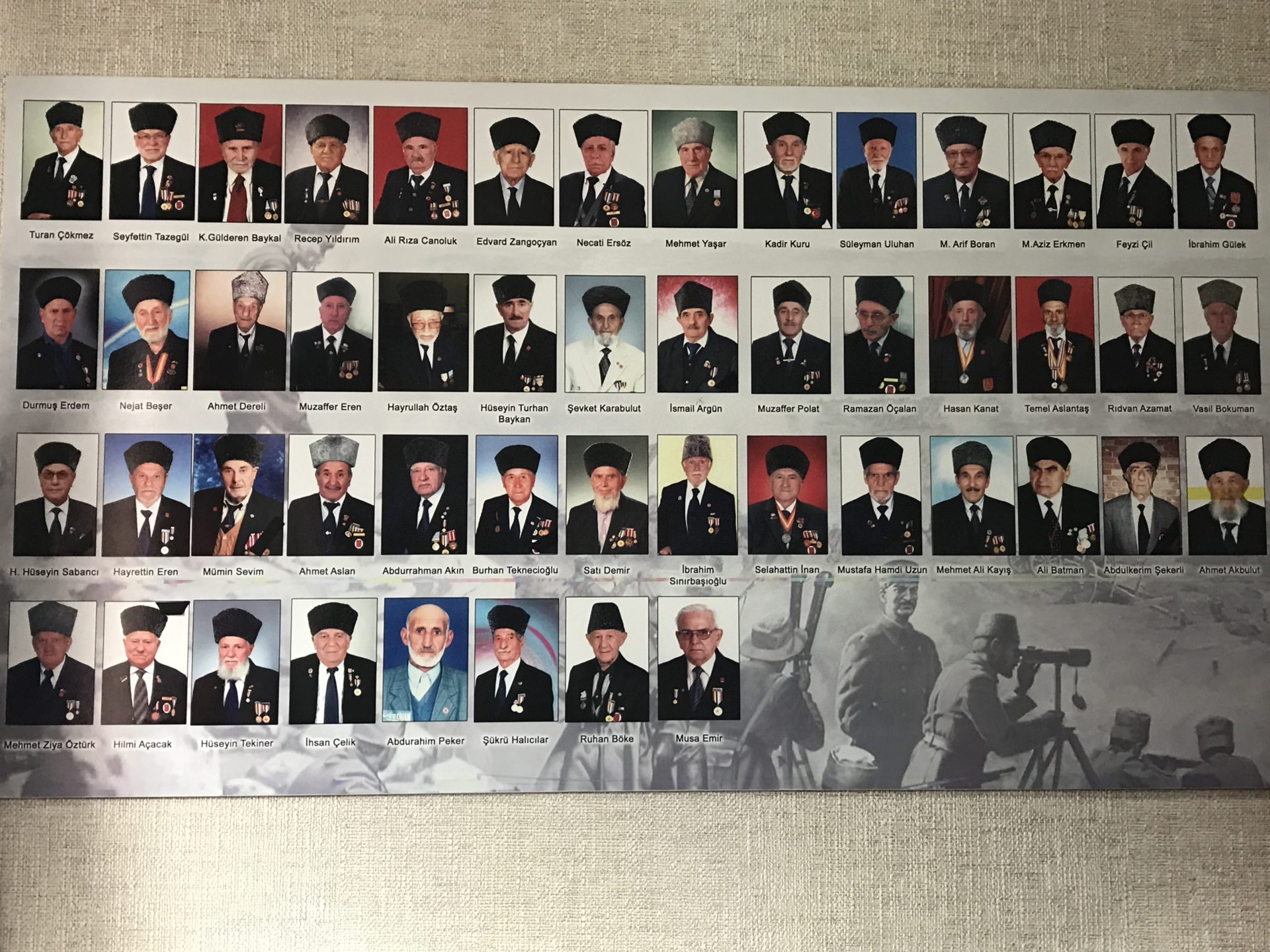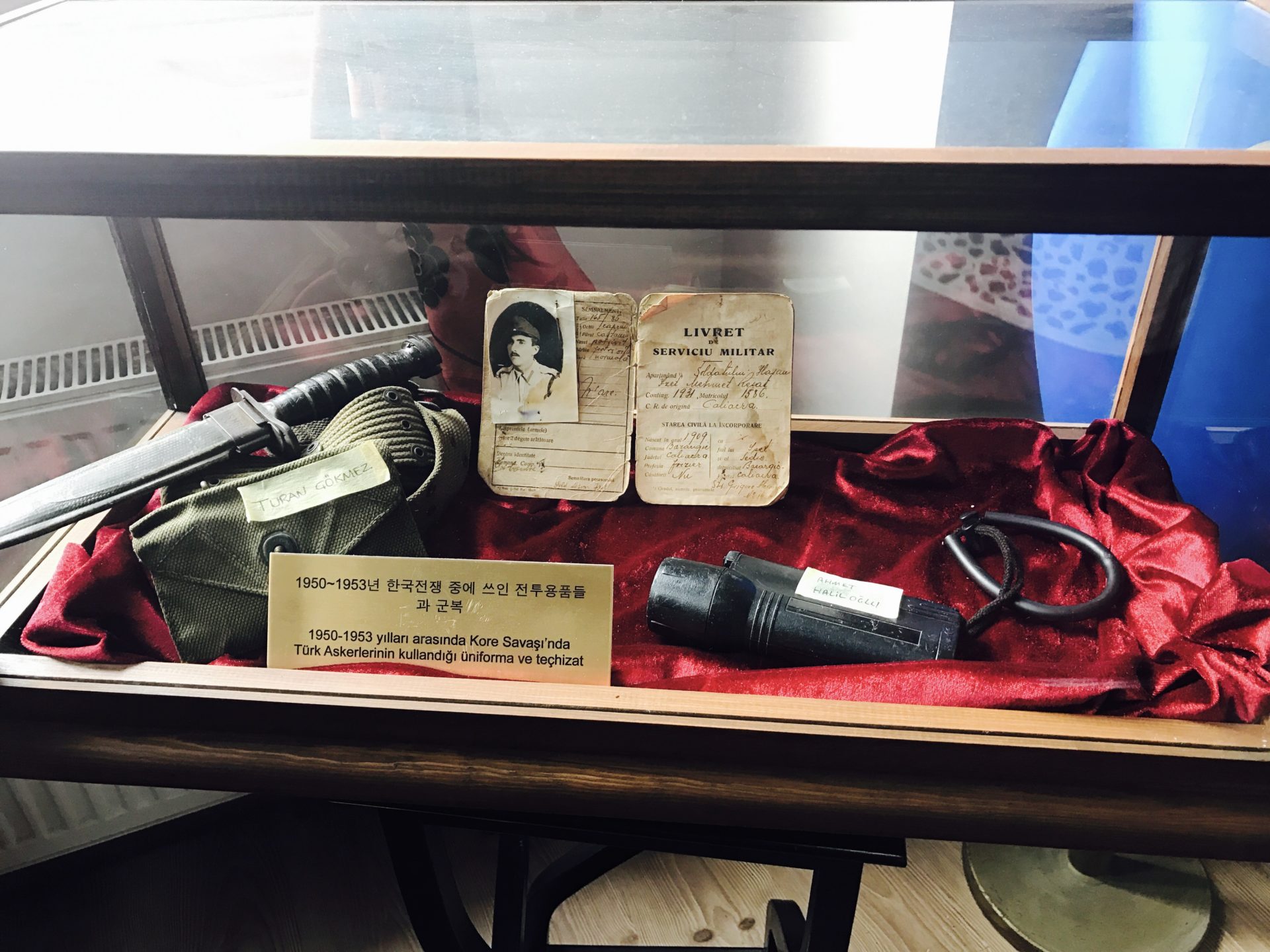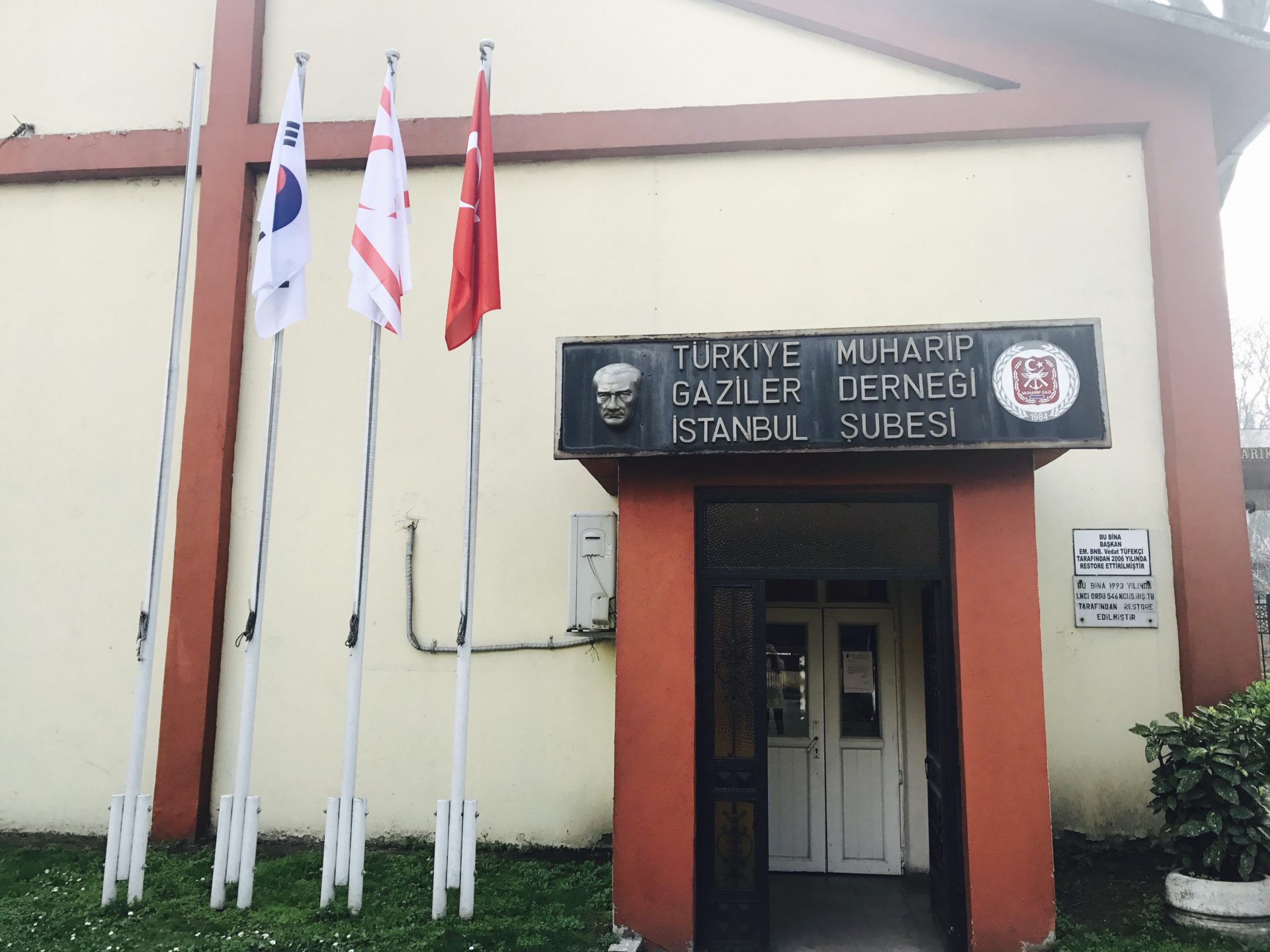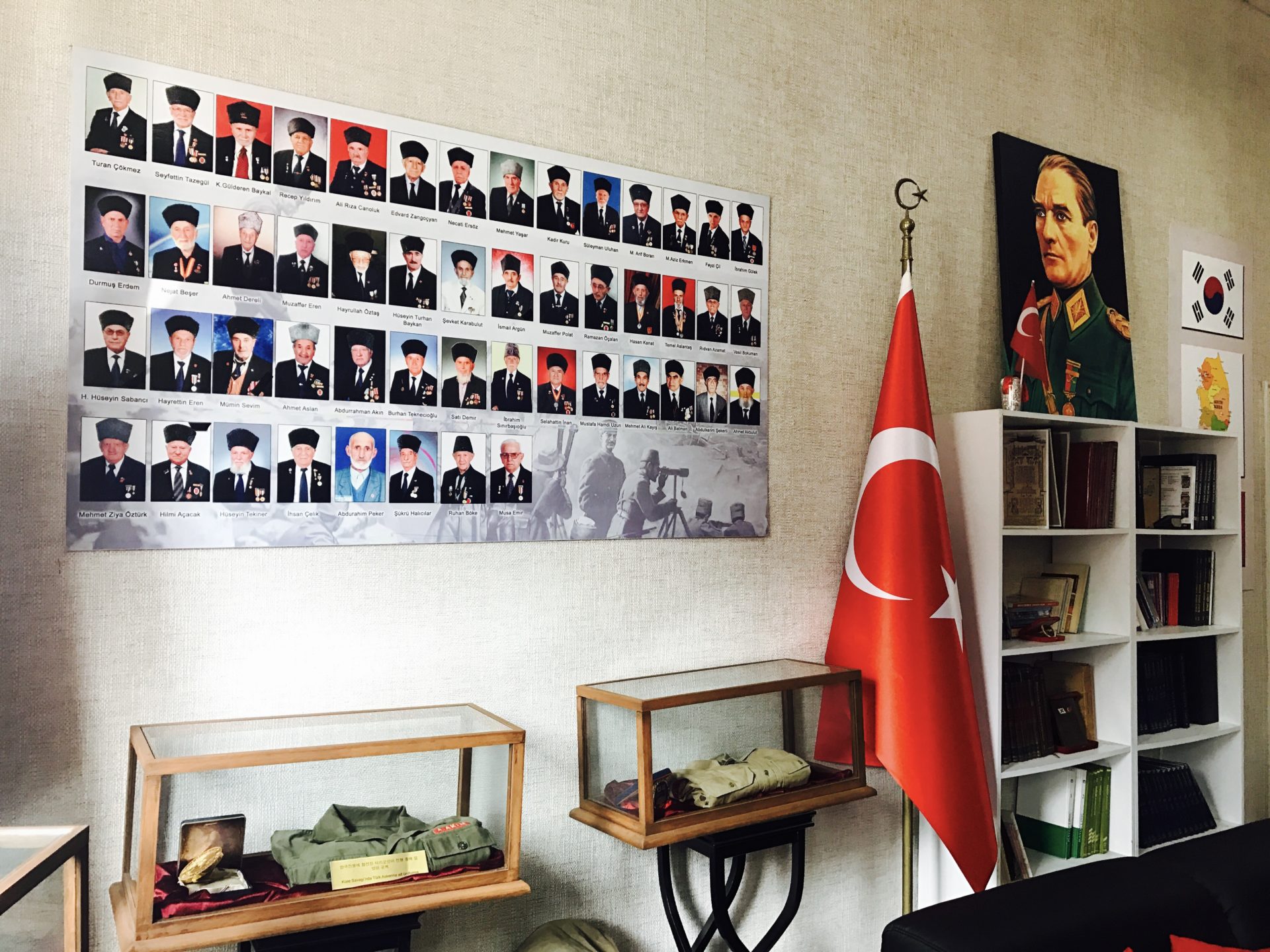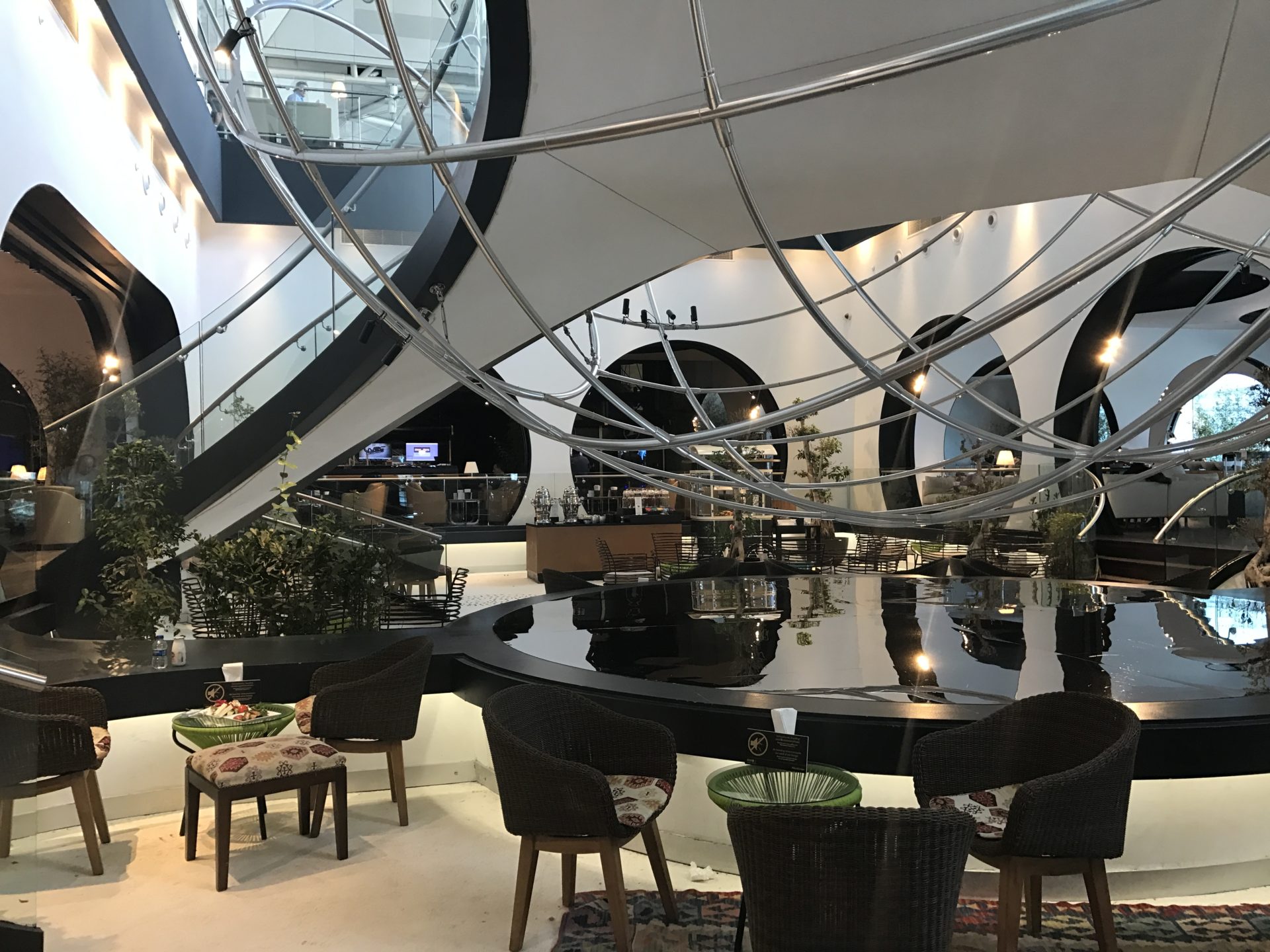Veteran Stories
>> [FOREIGN LANGUAGE].
>> And this association is also a museum for the people.
>> [FOREIGN LANGUAGE].
>> And this establishment was sponsored by a Korean firm called N11.
>> [FOREIGN LANGUAGE].
>> And this N11 company, the Korean company, helped us a lot.
>> [FOREIGN LANGUAGE].
>> Me and all the Korean veterans are really happy with all the Koreans who have supported us.
>> [FOREIGN LANGUAGE].
>> And their constant attention and help towards us always makes up happy.
>> [FOREIGN LANGUAGE].
>> And today, allowing us to interview with us and allowing us to tell our story also makes us really happy.
>> [FOREIGN LANGUAGE].
>> And as the president of this association, I'm really glad and happy that you guys are showing this kind of attention towards us.
>> Thank you.
>> [FOREIGN LANGUAGE].
>> [FOREIGN LANGUAGE].
>> My name is Asam Kanat, and I was born in [INAUDIBLE].
>> [FOREIGN LANGUAGE].
>> Our unit went to Korea in 1952, and we stayed there over 13 months, and I was part of the medical team.
>> [FOREIGN LANGUAGE].
>> And we had a hospital at the war zone, and we would treat injured soldiers, and if it was a really serious injury, we would take them back to the city.
>> [FOREIGN LANGUAGE].
>> [FOREIGN LANGUAGE].
>> [FOREIGN LANGUAGE].
>> [FOREIGN LANGUAGE].
>> [FOREIGN LANGUAGE].
>> We were mostly in the hospital, but we would see Korean people once in a while, and we would talk to them a little bit. [FOREIGN LANGUAGE].
>> [FOREIGN LANGUAGE].
>> I went to Seoul and Pusan, but most of my time was taking injured soldiers to hospitals or moving them to the required place. [FOREIGN LANGUAGE].
>> [FOREIGN LANGUAGE].
>> Has he ever been to Korea?
>> [FOREIGN LANGUAGE].
>> Afterwards?
>> [FOREIGN LANGUAGE].
>> It's been 64 years since I was in Korea, so I don't remember much. [FOREIGN LANGUAGE].
>> [FOREIGN LANGUAGE].
>> His friend was able to. It was for veterans [INAUDIBLE].
>> [FOREIGN LANGUAGE].
>> But I was sick, and I could not go to Korea again.
>> Okay.
[FOREIGN LANGUAGE]
>> My name is Mehmed Aziz Achman
[FOREIGN LANGUAGE]
>> My first time was 1950. I went to Korea for the first time.
[FOREIGN LANGUAGE]
>> I participated both of those wars.
[FOREIGN LANGUAGE]
>> We were [INAUDIBLE].
[FOREIGN LANGUAGE]
>> We had a furious war in that area.
[FOREIGN LANGUAGE]
>> We lost 600 people trying to get out of that crossfire.
[FOREIGN LANGUAGE]
>> [INAUDIBLE] Korean War, we entered the second war [INAUDIBLE] I think.
[FOREIGN LANGUAGE]
>> And in the first war, the Chinese soldiers who ambushed them, we fought them and won them in the second war.
[FOREIGN LANGUAGE]
>> And I'm going to talk about how I saw Korea when I went there.
[FOREIGN LANGUAGE]
>> Majority of the towns or cities, it has the population at the front naming this is the city's name, but it was all dirt and nothing else.
[FOREIGN LANGUAGE]
>> My first time when I saw the Korea was demolished, and everything was in ruins, but when I went back to Korea in 2012, I saw a whole new Korea that was really well and strong in every way.
[FOREIGN LANGUAGE]
>> And the last time that I went ... The last interview talked about the medallions the Korean War veterans received.
[FOREIGN LANGUAGE]
>> And I'd like to talk about that as well.
[FOREIGN LANGUAGE]
>> In Second World War ...
[FOREIGN LANGUAGE]
>> The 25th unit in the Second World War, the American unit, received this medallion.
[FOREIGN LANGUAGE]
>> And this medal for the first time was given to Turkish soldiers as well ...
[FOREIGN LANGUAGE]
>> ... as a high achievement as a soldier for the Turkish soldiers.
[FOREIGN LANGUAGE]
>> When I went to Korea for the first time, they told us the Korean alphabet has 480 letters, and the Korean alphabet was made of vines basically, but when I was Korea, everyone knew how to write and read, and that surprised me.
[FOREIGN LANGUAGE]
>> And the Korean climate is similar to Turkish climate, and I really do enjoy my stay in Korea.
[FOREIGN LANGUAGE]
>> After the Korean War, the Korean citizens also withdrew with us. Thousands of people went back with us.
[FOREIGN LANGUAGE]
>> He's talking about about Korean War when all the citizens have to withdraw backwards, and he remembers women trying to carry some rice balls on their head and some kids on their bags, and he also remembers kids that were lost trying to find their parents or the old people who could not go back stranded on the ground dying basically. No one could help them because everyone was in chaos, and he remembers all these.
[FOREIGN LANGUAGE]
>> And these people were trying to get away from the Chinese soldiers, and they had nothing to carry, so they basically tied two huge sticks in order to carry their few belongings and run away from that area.
[FOREIGN LANGUAGE]
>> And he's talking about how little kids, even in the winter, they only had a T-shirt on them, and they would talk to us, saying hello and chap chap, which means they wanted to food, and he remembers all these, and he remembers all the poverty and the destruction.
[FOREIGN LANGUAGE]
>> And every time I remember this, it's hard ... It's getting hard to talk for me.
[FOREIGN LANGUAGE]
>> We would give all our food and clothing to kids that were without because we couldn't ...
[FOREIGN LANGUAGE]
>> In Suwon, the war was really strong, and we met a family in Suwon.
[FOREIGN LANGUAGE]
>> There were three [INAUDIBLE].
[FOREIGN LANGUAGE]
>> They would wash our clothes, and we would give them all the food we have, the canned foods we have.
[FOREIGN LANGUAGE]
>> An elder woman and a male.
[FOREIGN LANGUAGE]
>> The man who was there, he lost his arm in the war and his wife, and they had three kids as well.
[FOREIGN LANGUAGE]
>> And the grandmother, one of her ... The middle finger was really bloated, and it was full of blood, and it was about to explode basically.
[FOREIGN LANGUAGE]
>> And she was in great pain.
[FOREIGN LANGUAGE]
>> And he gave her his medicine and a bandage for her.
[FOREIGN LANGUAGE]
>> And that bandage needed ... The bloating slowed, and it eventually healed slowly.
[FOREIGN LANGUAGE]
>> And they became really close with this family, and after that war, the family asked them to take us with you guys, but we were soldiers, and we couldn't take them.
[FOREIGN LANGUAGE]
>> And the day we had to leave Korea, the entire family came to us, and they were crying.
[FOREIGN LANGUAGE]
>> And I become really old, and every time I tell these stories, my heart breaks, and I feel really soft, and I can't stop myself from crying.
[FOREIGN LANGUAGE]
>> And it's been actually 67 years since all these, and I'm losing some of the memories, but still there are so many things that should be told, but it's really hard to even talk about them.
[FOREIGN LANGUAGE]
>> And when we reached Busan Port, I counted 36 US military ships.
[FOREIGN LANGUAGE]
>> And US ... He's saying US military send all those ships because they didn't believe Korea could win this war, and they were getting ready to ... Evacuation planning was getting ready for the US soldiers.
[FOREIGN LANGUAGE]
>> They sent [INAUDIBLE] war, so that they could withdraw their own soldiers and send us to the front line.
[FOREIGN LANGUAGE]
>> And after our war in Korean War, our achievement, US soldiers realized that this could be won, and that's how ... That's when they realized that this good war, and they started fighting properly.
[FOREIGN LANGUAGE]
>> And I used to write diary every day before I became a soldier, and even though I went there, I kept on writing every day.
[FOREIGN LANGUAGE]
>> First, I'd like to talk about the diaries and all the things that we wrote. One of our general's son took all these records and made us writing. They turned into writing, and he also wants to talk about that only three people know, his general and his lieutenant.
[FOREIGN LANGUAGE]
>> [INAUDIBLE] different district.
[FOREIGN LANGUAGE]
>> Basically, he used to be a messenger in the first war, and his general told him to go to a different district and tell them to join them because they need to get out of the crossfire that they were receiving, and they were planning for the next stage to get out together, but when he went to the other district, the leading commander of that area said, "You didn't see us here." He tried to ignore the order, and he said, "But this was order of the general," but he still ignored the command, and he had to go back to his general to report this, but the next day they had to fight out of that crossfire to get out, but that district didn't help them, and basically they had to get out without the help of the second district, which was really difficult for them. They lost a lot of people and ammo and vehicles as well in that.
[FOREIGN LANGUAGE]
>> And when he was talking, the son of the general was writing all this stuff, recording all the diaries and everything that soldiers wrote. He told him to tell him all these stories that were not told before because they were hidden.
[FOREIGN LANGUAGE]
>> And my son was with me as well.
[FOREIGN LANGUAGE]
>> And that son of the general is going to tell all these stories and record the videos as well, but it was 6 years ago to record.
[FOREIGN LANGUAGE]
>> And apparently he remembered his diary and everything that he faced, he wrote every single thing in those diaries.
[FOREIGN LANGUAGE]
>> And he turned all those into a book basically.
[FOREIGN LANGUAGE]
>> Wow. Wow.
>> This is his diary.
[FOREIGN LANGUAGE]
>> And he's giving this to you.
[FOREIGN LANGUAGE]
>> I talk too much.
>> No, thank you.
>> [FOREIGN LANGUAGE].
>> My name is Ibrahim Gulek.
>> Ibrahim Gulek [FOREIGN LANGUAGE].
>> I went to South Korea in [INAUDIBLE].
>> [FOREIGN LANGUAGE].
>> It took us 23 days to go to Korea with ship.
>> [FOREIGN LANGUAGE].
>> First when we went, we were the [INAUDIBLE].
>> [FOREIGN LANGUAGE].
>> When we first landed in Pusan port, we were exhausted for the long trip, and they let us rest for 2 days. Then we had to go to the war zone right after with a train.
>> [FOREIGN LANGUAGE].
>> We were going with a train, but the railroads were a little broken, and that caused the ride to be really slow because we couldn't go fast because of the railroads.
>> [FOREIGN LANGUAGE].
>> And when he first saw the Korean kids, he was surprised because they didn't have any clothes during the winter, and he thought the kids were able to withstand the cold because that was the first time they saw kids wearing basically nothing in this cold weather.
>> [FOREIGN LANGUAGE].
>> [FOREIGN LANGUAGE].
>> [FOREIGN LANGUAGE].
>> There was food, Turkish bread and meat in the middle.
>> [FOREIGN LANGUAGE].
>> He would basically give the food, and they would all try to take the food, basically, and they would take the food from someone else's mouth. That was how the situation was.
>> [FOREIGN LANGUAGE].
>> And when they saw this, they didn't think about their own deaths at all.
>> [FOREIGN LANGUAGE].
>> When we first reached the war zone, we had to dig our own cover ourselves.
>> [FOREIGN LANGUAGE].
>> All our hands were all destroyed and bruised because of digging a lot.
>> [FOREIGN LANGUAGE].
>> We were walking around underground.
>> [FOREIGN LANGUAGE].
>> And the gun was 7.5 kilograms that we were carrying everywhere with us.
>> [FOREIGN LANGUAGE].
>> I could not shoot anywhere. It was a long-range rifle, and I had seven targets that I had to hit.
>> [FOREIGN LANGUAGE].
>> And his lieutenant told him to shoot a specific target, but he had 200 bullets in his gun, in his rifle, and he would keep shooting at the area, but he could not see anything because of the dark.
>> [FOREIGN LANGUAGE].
>> And when he shoots a lot of bullets, the rifle gets really hot, and he has to change rifle as well.
>> [FOREIGN LANGUAGE].
>> And he constantly changed those rifles and put one of them underground in order to cool down. Then every night, he would spend around 1,500 bullets shooting at those targets.
>> [FOREIGN LANGUAGE].
>> And he went [INAUDIBLE] basically, and he would shoot at those areas, but he told his lieutenant that he could not see anything.
>> [FOREIGN LANGUAGE].
>> And the lieutenant told him that tomorrow morning, you'll see what you were shooting at.
>> [FOREIGN LANGUAGE].
>> And it's nighttime, and he went to the lieutenant, and he was sleeping in his bed.
>> [FOREIGN LANGUAGE].
>> The lieutenant in the night, he went to his lieutenant, and ...
>> [FOREIGN LANGUAGE].
>> ... he took the binoculars.
>> [FOREIGN LANGUAGE].
>> He looked through the binoculars to see what he was shooting at.
>> [FOREIGN LANGUAGE].
>> And when he looked through the binoculars, he saw a huge hill, but when he looked closely, he realized that it was all corpses, actually, human bodies that were put together up there.
>> [FOREIGN LANGUAGE].
>> Every district or area unit had one phone [INAUDIBLE].
>> [FOREIGN LANGUAGE].
>> It was for them shooting the crossfire so that the enemy could not dodge or go towards one area.
>> [FOREIGN LANGUAGE].
>> And also, they would shoot in a crossfire [INAUDIBLE] bombed area, and he would see the trees that were full of holes, basically.
>> [FOREIGN LANGUAGE].
>> And the [INAUDIBLE] were actually good in every way. He's seen that.
>> [FOREIGN LANGUAGE].
>> And in the medallion ceremony where they had their pulling rope game, he was part of that as well against the US military.
>> [FOREIGN LANGUAGE].
>> Basically, it was 10 US soldiers and 10 Turkish veterans, and there was water in the middle, and they were playing who would pull the other side to the water.
>> [FOREIGN LANGUAGE].
>> So the Turkish soldiers dug in the ground with ...
>> [FOREIGN LANGUAGE].
>> So their tactic was, they know that US soldiers were bigger and larger and stronger than them, so they basically at least threw up a little bit, and once they were losing their balance, they would pull in that time, and they won the pulling game with that tactic.
>> [FOREIGN LANGUAGE].
>> In the war ...
>> [FOREIGN LANGUAGE].
>> [INAUDIBLE] basically they were English soldiers a lot, but they were hiding in the bushes to try to pull it back, but the Turkish soldiers would just charge in even though they did not fear anything, and he forced himself to go straight in the line and under pushes that that's why the Turkish soldiers won that small battle in the area.
>> [FOREIGN LANGUAGE].
>> And in the medal ...
>> [FOREIGN LANGUAGE].
>> ... for every Turkish soldier, a US soldier would accommodate that person and buy food and take him around, and a high-ranking officer was chosen for him.
>> [FOREIGN LANGUAGE].
>> [INAUDIBLE] after I went back to ...
>> [FOREIGN LANGUAGE].
>> Back in those days ...
>> [FOREIGN LANGUAGE].
>> ... they would exchange mail.
>> [FOREIGN LANGUAGE].
>> Ask him about Korea.
>> [FOREIGN LANGUAGE].
>> And he's talking about the time when they were in the forest, and there were a lot of Korean citizens as well because they could not live in those houses because of the bombing and attack, and a lot of Turkish soldiers would take their food and everything and give it to the Korean citizens who were living in those forests with them.
>> [FOREIGN LANGUAGE].
>> But the US soldiers thought that we were selling the food to the Korean citizens ...
>> [FOREIGN LANGUAGE].
>> ... and asked whether we had money or not from all the food that we gave.
>> [FOREIGN LANGUAGE].
>> The soldiers thought that the Turkish soldiers were selling because they did not think that they would give their own everything to the Korean citizens, and that's why US citizens were suspicious of Turkish soldiers, but once they realized and asked the Korean citizens that they had no money or anything, they just gave the food for free to the Korean citizens, they thought that the Turkish soldiers were kind of stupid because they were going to be weaker, and they left without finding anything.
>> [FOREIGN LANGUAGE].
>> [FOREIGN LANGUAGE].
>> [FOREIGN LANGUAGE].
>> [FOREIGN LANGUAGE].
>> [FOREIGN LANGUAGE].
>> The Koreans loved us a lot, and it feels like we're blood brothers, basically.
>> [FOREIGN LANGUAGE].
>> [FOREIGN LANGUAGE].
>> [FOREIGN LANGUAGE].
>> [FOREIGN LANGUAGE].
>> [FOREIGN LANGUAGE].
>> [FOREIGN LANGUAGE].
>> [FOREIGN LANGUAGE].
>> [FOREIGN LANGUAGE].
>> They went back to Korea in 1999.
>> [FOREIGN LANGUAGE].
>> [FOREIGN LANGUAGE].
>> [FOREIGN LANGUAGE].
>> And when they landed, they were going to go see the places they fought at.
>> [FOREIGN LANGUAGE].
>> And they turned those houses into museums, and he was going towards those area with other veterans as well.
>> [FOREIGN LANGUAGE].
>> And the graveyards.
>> [FOREIGN LANGUAGE].
>> And there were 165 ...
>> [FOREIGN LANGUAGE].
>> [INAUDIBLE].
>> [FOREIGN LANGUAGE].
>> And he's talking about ...
>> [FOREIGN LANGUAGE].
>> ... when he was in a tank in the war.
>> [FOREIGN LANGUAGE].
>> He's talking about when he went back to the graveyards of the other people who died. He saw one of his friends who died in a tent when they were together, and there was a bullet shrapnel that fell from the top, and one went towards his friend, so his friend died, and he saw his grave when he went back, and he cried when he saw that.
>> [FOREIGN LANGUAGE].
>> He was a really good person that passed away, his friend.
>> Is he buried in the United Nations Pusan Cemetery?
>> [FOREIGN LANGUAGE].
>> [FOREIGN LANGUAGE].
>> Tell him, "What is his name?"
>> [FOREIGN LANGUAGE].
>> Sebatin.
>> Sebatin.
>> Sebatin. His last name?
>> [FOREIGN LANGUAGE].
>> [FOREIGN LANGUAGE].
>> [FOREIGN LANGUAGE].
>> Tell him, when I go to the United Nations Pusan Cemetery, I'll visit him too.
>> [FOREIGN LANGUAGE].
>> [FOREIGN LANGUAGE].
>> He is actually not in the [INAUDIBLE].
>> [FOREIGN LANGUAGE].
>> He prayed to Allah in that graveyard.
>> [FOREIGN LANGUAGE].
>> People were wondering why would he do it, but he said, "I don't care. I want to pray."
>> [FOREIGN LANGUAGE].
>> And he sees himself online where he's praying in the graveyard for the ...
>> [FOREIGN LANGUAGE].
>> Basically, he's seen on the Internet that he went back after 60 years and saw his friends, and he prayed for God.
>> [FOREIGN LANGUAGE]
>> He's the leader or the president of his association, and he's a retired veteran.
>> [FOREIGN LANGUAGE]
>> "And I am a veteran from [INAUDIBLE]."
>> [FOREIGN LANGUAGE]
>> This association started in 1984 for the [INAUDIBLE] and Korean War Veterans.
>> [FOREIGN LANGUAGE]
>> This association started [FOREIGN LANGUAGE] the small room. In 2004, the government allowed this building to give ... Gave this building for the veterans.
>> [FOREIGN LANGUAGE]
>> And the current population of this building is 2,005 people.
>> [FOREIGN LANGUAGE]
>> And 200 people of these people are from the Korean War.
>> [FOREIGN LANGUAGE]
>> The youngest of these Korean veterans, he is 86 years old, and about 70 percent of these people can't even walk and are currently staying here.
>> [FOREIGN LANGUAGE]
>> This room is made for the Korean Veterans for them to meet once every week on Thursday to spend their time and meet with each other.
>> [FOREIGN LANGUAGE]
>> And from the objects they gave us ...
>> You saved. They remember you too.
>> [FOREIGN LANGUAGE].
>> [FOREIGN LANGUAGE].
>> He's really happy, and he's hoping that South Korea stays strong.
>> [FOREIGN LANGUAGE].
>> He's telling you that ...
>> [FOREIGN LANGUAGE].
>> [FOREIGN LANGUAGE].
>> ... when he went back to Korea, he realized the kids these days are taller and bigger [INAUDIBLE].
>> Aw, don't cry.
>> [FOREIGN LANGUAGE].
>> Oh, thank you. Do you remember me from 2009 when you visited Korea?
>> [FOREIGN LANGUAGE].
>> [FOREIGN LANGUAGE].
>> [FOREIGN LANGUAGE].
>> [FOREIGN LANGUAGE].
>> [FOREIGN LANGUAGE].
>> [FOREIGN LANGUAGE].
>> He went to Korea in 2012.
>> Oh, '12.
>> He didn't go in 2009.
>> [FOREIGN LANGUAGE].
>> [FOREIGN LANGUAGE].
>> [FOREIGN LANGUAGE].
>> When they were coming back from Korea, they went really fast.
>> [FOREIGN LANGUAGE].
>> When the plane landed really hard on the ground, all five of us lost our balance really hard, and it did to us something that [INAUDIBLE].
>> [FOREIGN LANGUAGE].
>> [FOREIGN LANGUAGE].
>> [FOREIGN LANGUAGE].
>> People who see us might look at his age, but he's still [INAUDIBLE].
>> Oh, thank you.
>> [FOREIGN LANGUAGE].
>> Thank you.
>> [FOREIGN LANGUAGE].
>> Okay.
>> You saved. They remember you too.
>> [FOREIGN LANGUAGE].
>> [FOREIGN LANGUAGE].
>> He's really happy, and he's hoping that South Korea stays strong.
>> [FOREIGN LANGUAGE].
>> He's telling you that ...
>> [FOREIGN LANGUAGE].
>> [FOREIGN LANGUAGE].
>> ... when he went back to Korea, he realized the kids these days are taller and bigger [INAUDIBLE].
>> Aw, don't cry.
>> [FOREIGN LANGUAGE].
>> Oh, thank you. Do you remember me from 2009 when you visited Korea?
>> [FOREIGN LANGUAGE].
>> [FOREIGN LANGUAGE].
>> [FOREIGN LANGUAGE].
>> [FOREIGN LANGUAGE].
>> [FOREIGN LANGUAGE].
>> [FOREIGN LANGUAGE].
>> He went to Korea in 2012.
>> Oh, '12.
>> He didn't go in 2009.
>> [FOREIGN LANGUAGE].
>> [FOREIGN LANGUAGE].
>> [FOREIGN LANGUAGE].
>> When they were coming back from Korea, they went really fast.
>> [FOREIGN LANGUAGE].
>> When the plane landed really hard on the ground, all five of us lost our balance really hard, and it did to us something that [INAUDIBLE].
>> [FOREIGN LANGUAGE].
>> [FOREIGN LANGUAGE].
>> [FOREIGN LANGUAGE].
>> People who see us might look at his age, but he's still [INAUDIBLE].
>> Oh, thank you.
>> [FOREIGN LANGUAGE].
>> Thank you.
>> [FOREIGN LANGUAGE].
>> Okay.
>> [FOREIGN LANGUAGE].
>> We were invited in 2010 to go to Korea with my wife.
>> [FOREIGN LANGUAGE].
>> When I was injured back in the war, I took an ambulance that went past the Han River.
>> One bridge [FOREIGN LANGUAGE].
>> There was only one bridge that was about to be collapsed.
>> [FOREIGN LANGUAGE].
>> But when I went back in 2010, I saw there were 29 bridges on the river, and I was really impressed.
>> [FOREIGN LANGUAGE].
>> He's saying all the Korean people are really polite and hardworking.
>> [FOREIGN LANGUAGE].
>> One day, they took us to a village.
>> [FOREIGN LANGUAGE].
>> It was 75 kilometers away from Seoul.
>> [FOREIGN LANGUAGE].
>> It represented Korea 100 years ago. They made a village to present that old time.
>> [FOREIGN LANGUAGE].
>> It was sort of a museum where they created a scenario of Korea 100 years ago where kids would go to learn about Korean history.
>> [FOREIGN LANGUAGE].
>> When I went there, I saw kids sit down in the [INAUDIBLE] and the teachers would explain them about the history of Korea.
>> [FOREIGN LANGUAGE].
>> And after the teacher told the kids about the stories, the kids started running towards us, and they started hugging us and kissing our hand.
>> [FOREIGN LANGUAGE].
>> There was one really handsome kid. I think he was around 13 years old.
>> [FOREIGN LANGUAGE].
>> He hugged me and kissed my hand.
>> [FOREIGN LANGUAGE].
>> And he looked up to me and said, "Atatürk."
>> [FOREIGN LANGUAGE].
>> And when I looked, the teacher was waving. She was waving her hand.
>> [FOREIGN LANGUAGE].
>> The teacher basically told them about the Turkish soldiers, how they lived thousands of miles away, but they came to our country and fought for us, and their leader was Atatürk, and she told this, and he cried.
>> [FOREIGN LANGUAGE].
>> I went to his mausoleum in Ankara, yes.
>> [FOREIGN LANGUAGE].
>> [FOREIGN LANGUAGE].
>> Menetia Urstik.
>> My name is Menetia Urstik.
>> [FOREIGN LANGUAGE].
>> In 1950, I went to Korea.
>> On November 29th, I was shipped from Ankara to ...
>> [FOREIGN LANGUAGE].
>> From İskenderun, we took the [INAUDIBLE] ship and went to Korea.
>> [FOREIGN LANGUAGE].
>> And from the Black Sea to the Columbia then eventually we landed in Pusan.
>> [FOREIGN LANGUAGE].
>> And the US soldiers and Korean citizens greeted us in Pusan Port.
>> [FOREIGN LANGUAGE].
>> [FOREIGN LANGUAGE].
>> [FOREIGN LANGUAGE].
>> And with the train, we went to take off.
>> [FOREIGN LANGUAGE].
>> First 15 days of training in [INAUDIBLE] were at the [INAUDIBLE].
>> [FOREIGN LANGUAGE].
>> And once they reached the [INAUDIBLE].
>> [FOREIGN LANGUAGE].
>> When they reached Manchuria, they got an order saying that ...
>> [FOREIGN LANGUAGE].
>> They said that [INAUDIBLE] right away because 300,000 Chinese soldiers were coming.
>> [FOREIGN LANGUAGE].
>> And it was really difficult in the hillside to go with the cars because the roads weren't properly done, and we did our best to reach the Korean hospital.
>> [FOREIGN LANGUAGE].
>> My commanding officer who passed away in that war told me that everyone should be really careful because all the soldiers.
>> [FOREIGN LANGUAGE].
>> Around 10:30 that night, the Chinese soldiers started attacking us.
>> [FOREIGN LANGUAGE].
>> And we lost a lot of people in that, and there was a command that told us to [FOREIGN LANGUAGE].
>> [FOREIGN LANGUAGE].
>> [FOREIGN LANGUAGE].
>> [FOREIGN LANGUAGE].
>> [FOREIGN LANGUAGE].
>> [FOREIGN LANGUAGE].
>> [FOREIGN LANGUAGE].
>> And the command was for all of them to go to a different town as fast as possible.
>> [FOREIGN LANGUAGE].
>> And even though we saw a lot of our friends die that day, we had the command to shoot our bombs towards them as soon as possible.
>> [FOREIGN LANGUAGE].
>> And they were shooting their bombs more towards the enemy soldiers, and they were [INAUDIBLE] and then he saw bodies flying around in that time.
>> [FOREIGN LANGUAGE].
>> And we fought until the morning, and we received a command saying that US soldiers were coming to support us, and we saw the US planes, and we kept on fighting through the entire night and also in the morning.
>> [FOREIGN LANGUAGE].
>> And the Chinese soldiers were taking the corpses of the Turks and the US soldiers and hanging them where they can see them and burning them and shouting at them.
>> [FOREIGN LANGUAGE].
>> And we were about to engage because our soldiers were really mad, but then the US soldiers signaled the enemy side [INAUDIBLE] with a little piece of paper, and he was [INAUDIBLE] that area, and the enemy soldiers started [INAUDIBLE] more silent, and they had to cover themselves, and that's when we had to [INAUDIBLE] backwards.
>> [FOREIGN LANGUAGE].
>> And [INAUDIBLE] backwards, and again, when they came for us, we fought for 24 hours, and we basically protected a specific US unit in that time.
>> [FOREIGN LANGUAGE].
>> And that was the reason the US Army gave the Turkish unit the Silver Star because they didn't fall back or separate. They stick together in order to protect the 25th Unit of the US Army in that time.
>> [FOREIGN LANGUAGE].
>> And they found a little kid by himself, and his commander officer leaned in. [FOREIGN LANGUAGE].
>> Ila.
>> They named him Ila, and they protected him during that time.
>> [FOREIGN LANGUAGE].
>> And after a year where we had to leave, another soldier [INAUDIBLE] took care of the little kid in that time.
>> [FOREIGN LANGUAGE].
>> And when they were treating, and they saw a lot of Korean citizens trying to run away just like the Syrian people trying to get away and find shelter, and they gave, the soldiers gave them, more than they had in order to support them, and they kept receiving thank-yous and Korean [INAUDIBLE] from them.
>> [FOREIGN LANGUAGE].
>> The biggest losses were [FOREIGN LANGUAGE].
>> [FOREIGN LANGUAGE].
>> The biggest losses were ...
>> [FOREIGN LANGUAGE].
>> One of the battles, most, actually all my unit died, including my commanding officer in that battle, but I was able to get away. I was 100 meters behind one of my friends who was caught in that fight, and he was captured, and after that ambush, the US soldiers attacked the next battle and found out that he was a Turkish soldier, and they sent him to Japan to get treated for 3 months in the hospital.
>> [FOREIGN LANGUAGE].
>> And from his unit, only him and he survived. He went to find him in Turkey when he went back, but he couldn't find his address, and he couldn't see his friend.
>> [FOREIGN LANGUAGE].
>> I was born in '29. I'm 88 years old.
>> [FOREIGN LANGUAGE].
